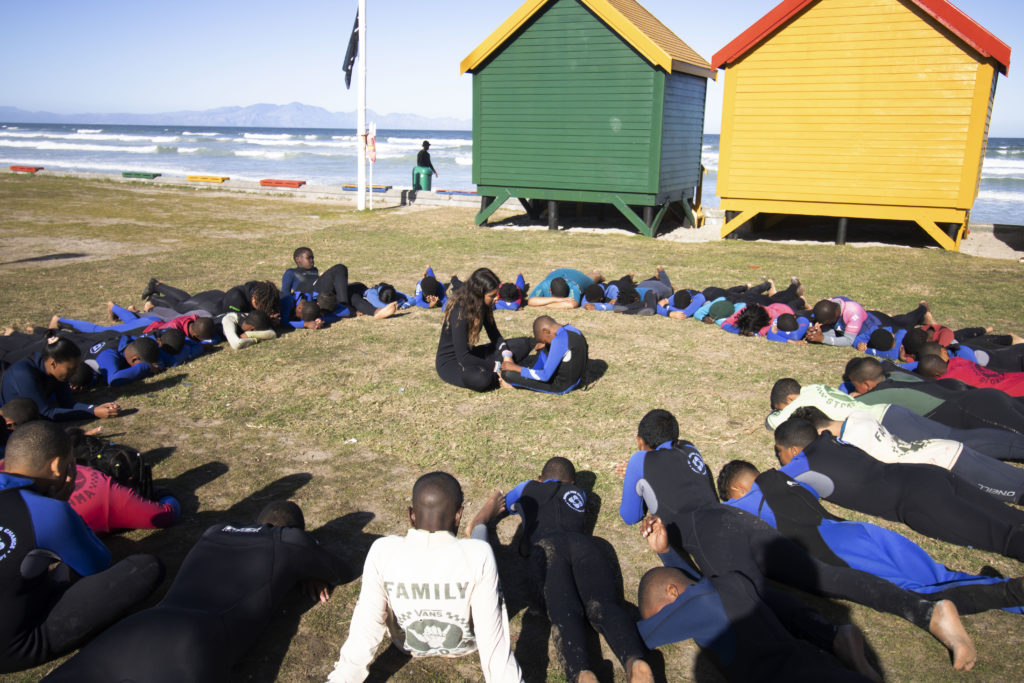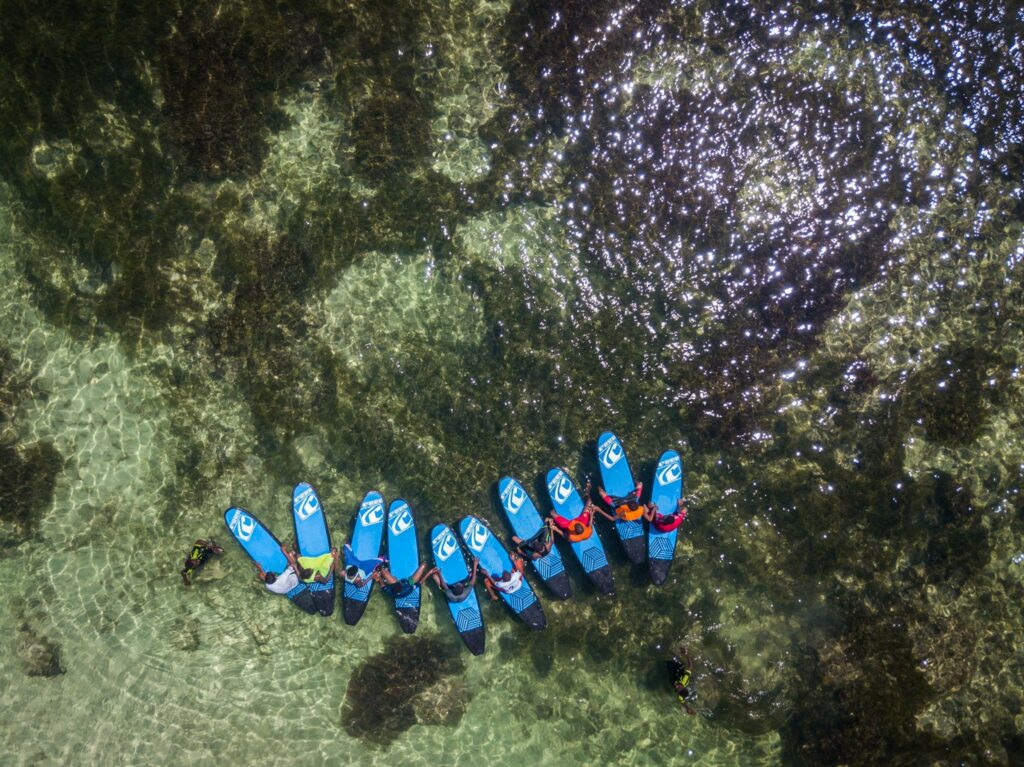Evidence for Surf Therapy: Liberia Case Study

We’re continuing our series in association with the Wave Alliance, sharing the amazing work they are doing to bring their revolutionary surf therapy program to underprivileged coastal communities.
A huge part of their work is bringing hard evidence and research to a field which has, up until now, largely relied on anecdotal testimonies to uphold its efficacy. Below, researcher and practitioner Jamie Marshall talks through some of this evidence in relation to one of the first partners of the Wave Alliance in Liberia.
Back in February of last year, when things were still looking a little less ‘2020ish’, it was my privilege to tour the Finisterre stores across the UK with Tim Conibear and Apish Tshetsha discussing the Wave Alliance project. This project is an incubator designed to support start up surf therapy organizations across the developing world to positively impact on mental health within their own communities. You can read more about the Wave Alliance here.
For those of you who attended the Wave Alliance tour you will remember how we constantly stressed the programme was highly contextual but also fundamentally ‘evidence based.’ By this we mean the Wave Alliance is based upon and constantly grounded in the rigorously investigated and up to date scientific research. A lot of research is focused on effectiveness, a term that has been in the news a lot recently due to vaccine trials. Effectiveness refers to whether an intervention, pharmaceutical or social, achieves the goals it sets out to do. In the case of the Wave Alliance this question would be; “did the Wave Alliance partner programs have a positive impact on mental health within their context?” The Broadcast will be hosting stories from several of these partners over the coming year and attached to each article will be a link to associated evaluations where you can see how these partners achieved their associated outcomes.
Alongside effectiveness, another important part of the Wave Alliance evidence base is ‘programme theory.’ This refers to the processes that enable organizations to achieve outcomes, the ‘how’ of how an intervention works. Before sharing the Wave Alliance model, a clear understanding of this programme theory needed to be solidified and to do this we worked with Waves for Change in Liberia. The Waves for Change Liberia site was the first example of translating the Waves for Change model beyond South Africa and understanding its success was a springboard to the Wave Alliance model as it exists today.
To explore programme theory in Waves for Change Liberia, I spent 3 months in Harper with participants and coaches, recording conversations with them about surf therapy. One of the best ways to investigate programme theory is to ask about it! This simplifies what is a more complex process to ensure sufficient scientific rigour. Taking this approach, interviews were focused on understanding participant experiences of surf therapy in as much depth as possible. From analysis of these experiences, we were able to construct a programme theory as illustrated below.
The ‘Bananas Culture’
To give a little context, the ‘Bananas Culture’ was a name chosen by the original Waves for Change participants that Tim and Apish worked with when they first established the intervention. The surfers first involved in the project instinctively threw shakas to celebrate participants’ waves, to which the participants asked, “why are you making a banana sign with your hand??” From that day forward the positive mental health culture developed in and around Waves for Change sessions became known as the ‘Banana’s Culture’ and continues to provide the foundations for spreading surf therapy in the Wave Alliance.
There were several key findings around the most important elements of the Waves for Change surf therapy model. One of the most foundational elements was the creation of a ‘safe space’ within the intervention and at the beach that participants compared to family.
I feel good because my coaches can be around me, my surfing family make me feel good. – Waves for Change Participant, Liberia
They (the coaches) are taking care of us like their own children, they never beat on us and they speak to us like sister and brother. – Waves for Change Participant, Liberia
This familial safe space allows for peer support, sharing of feelings and difficulties and a space completely free of judgement. Access to a safe space is fundamental for well-being, I am sure reading this you can think of times where you are grateful to access to such a safe space or wish you had. It cannot be stressed how important this is in a post-conflict situation like Liberia. One of the defining features of a post-conflict context is the complete breakdown of societal support structures, all the way from national infrastructure right down to the family unit.
Another key finding within the Waves for Change programme theory was the effective manner it taught its Banana’s curriculum. Those of you who attended the tour earlier will be well aware of the ‘culture’ the intervention uses to share its curriculum, based upon prosocial behaviours and coping skills. One of the key learnings we found in Liberia is how effective the surf environment proved in teaching these skills.
They (the coaches) are taking care of us like their own children, they never beat on us and they speak to us like sister and brother. – Waves for Change Participant, Liberia
Being able to practice coping skills in response to real physiological and emotional stressors, such as a bad wipe-out, seems to enabled learnt coping skills and behaviours to really stick with participants. This dynamic learning environment in the surf, as opposed to practising skills in a more sterile or less interactive environment, seems to have entrenched these learnings and enabled participants to use them in their wider lives.
Finally surfing itself seemed to have a direct positive impact on participants, a sense of respite from their regular stressors or negative feelings. It appeared to do this through the complete focus the sport demands. When surfing you must focus on the wave, the board and your surroundings.
The surfing is great, the surfing helps to clean down the stress on the mind. – Waves for Change Participant, Liberia
I am surfing, I am always focused on the board, I don’t think about anything else. That’s how I focus, I focus just on the board. Maybe after I am surfing, I have other things in my mind, but while I am surfing, I do not think about anything else just the board. – Waves for Change Participant, Liberia
This finding triangulates with other research into surf therapy, by both myself and other researchers. It is possible that the psychological state of ‘flow’ or being in the zone contributes to this respite effect. Flow is normally explored in terms of performance and further research is required to explore this possible direct impact on mental health. Flow states could well explain the age old anecdote of ‘only a surfer knows the feeling.’
These are just some of the key findings we made within our research into programme theory in Waves for Change Liberia and that have subsequently provided the theoretical framework for the Wave Alliance project. Such research provides an evidence base to spread surf therapy and underpin the idea of an ocean for everyone to support mental health. Research like this is by no means the end however and with every question we answer, another question is born. The Wave Alliance will continue its work to explore these questions alongside every new partner we work with and together we can find more answers supporting surf therapy across the world.
If you would like to read about this work in more depth it was recently published in the Journal of Sport for Development and can be accessed here. And if you would like some top tips to reading scientific journals check out this previous piece on the Broadcast summarising the Global Journal of Community Psychology Practice’s special issue on Surf Therapy.
This article originally appeared on Finisterre, as part of their wonderful support of an ocean for all.
We’ve been working with Finisterre for many years now. We share the same passion for the sea and the same belief that in the ocean we find ourselves and our community. We’re excited to partner with Finisterre to tell the story of the Wave Alliance and connect more and more people to the power of the ocean over the coming months and years. The more people we can introduce to the ocean, the better. We hope you’ll join us for the ride.


